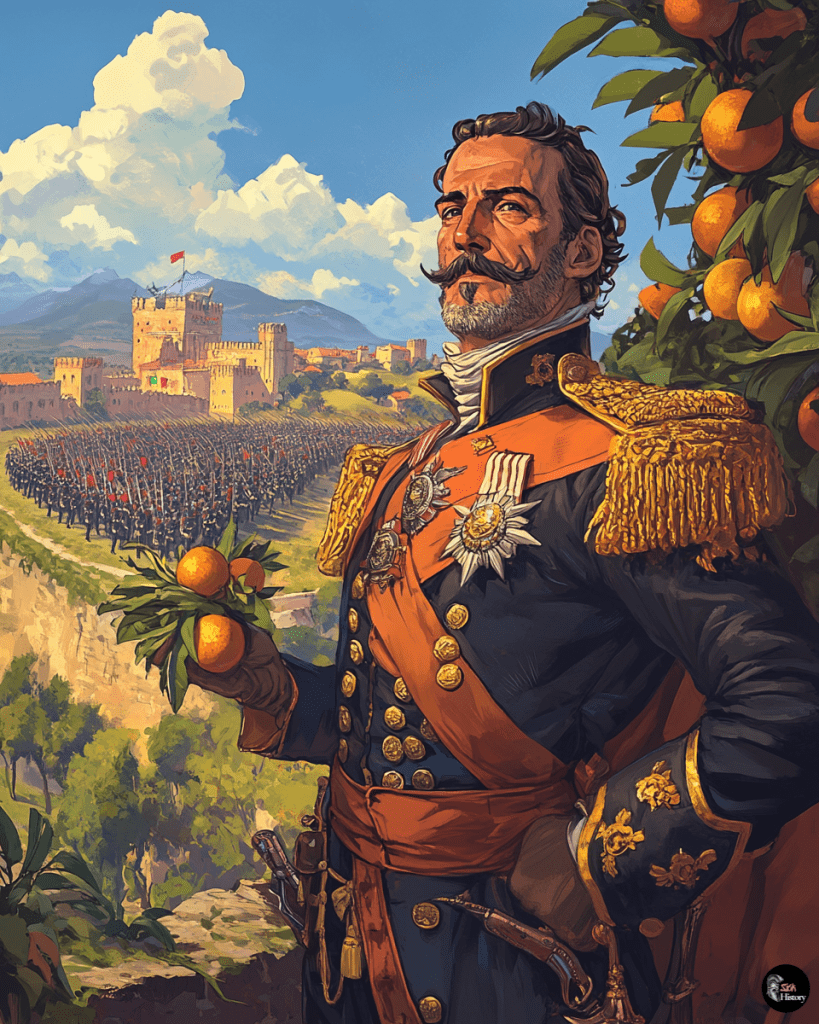The War of the Oranges was a short-lived conflict in 1801 that pitted Spain and France against Portugal. This minor skirmish had far-reaching consequences for the Iberian Peninsula.
The war lasted only a few weeks but resulted in Portugal ceding territory to Spain and closing its ports to British ships.
Spanish forces led by Manuel de Godoy invaded Portugal in May 1801. They quickly captured the town of Olivenza near the Spanish border.
After this victory, Godoy plucked oranges from trees in nearby Elvas and sent them to the Spanish queen, giving the war its peculiar name.
The conflict ended with the Treaty of Badajoz on June 6, 1801.
Portugal agreed to close its ports to British ships and cede Olivenza to Spain. This brief war foreshadowed the larger Peninsular War that would engulf the region a few years later.
War of the Oranges
The War of the Oranges was a brief conflict in 1801 between Portugal and the allied forces of Spain and France. It resulted in territorial changes and shifts in political alliances on the Iberian Peninsula.
The Brief Conflict of 1801
The War of the Oranges lasted only from May to June 1801.
Spanish troops, supported by France, invaded Portugal after the Portuguese refused Napoleon’s demands to break ties with Britain.
Spanish forces quickly captured several Portuguese towns, including Olivenza and Juromenha.
Portuguese resistance was limited, with only the fortress of Elvas holding out against the invasion.
The war ended with the Treaty of Badajoz, signed on June 6, 1801.
Portugal and Spain: Background of Tensions
Tensions between Portugal and Spain had been building for years prior to the conflict.
Portugal maintained a long-standing alliance with Britain, which put it at odds with Spain and France.
Napoleon saw Portugal as a weak link in his continental system against Britain. He pressured Spain to invade Portugal and forced it to close its ports to British ships.
Portugal’s refusal to comply with French demands led to the invasion. The country found itself caught between its British allies and the powerful Franco-Spanish alliance on the continent.
The Involvement of Manuel de Godoy
Manuel de Godoy, the Spanish Prime Minister, played a crucial role in the War of the Oranges.
He led the Spanish invasion forces and negotiated directly with Napoleon.
Godoy’s swift military success enhanced his political standing in Spain. He captured several towns and fortresses along the Portuguese border.
The name “War of the Oranges” stems from Godoy’s gesture of sending oranges to Queen María Luisa of Spain.
This act symbolized his easy conquest of Portugal’s orange-growing regions.
Godoy’s involvement helped cement the Franco-Spanish alliance.
Aftermath and Consequences
The War of the Oranges resulted in significant territorial changes and diplomatic shifts in the Iberian Peninsula. These alterations had lasting impacts on Portugal’s borders and international relations.
Badajoz and Olivenza: The Disputed Territories
The Treaty of Badajoz, signed on June 6, 1801, formalized the end of hostilities between Spain and Portugal.
A key provision was the cession of Olivenza to Spain. This small town near the Spanish frontier became a point of contention.
Portugal never fully accepted the loss of Olivenza. The dispute over this territory continued long after the war’s conclusion.
It remains unresolved to this day, with Portugal still claiming sovereignty over Olivenza.
Portugal’s Cession of Territories
Beyond Olivenza, Portugal faced additional territorial losses.
The country was forced to cede parts of its South American colony, Brazil, to France. This included territory in present-day French Guiana.
Portugal also had to close its ports to British ships. This action strained the long-standing Anglo-Portuguese alliance dating back to 1373.
The closure aimed to isolate Britain economically, aligning with Napoleon’s Continental System.
Impact on the Portuguese Kingdom
The war’s outcome significantly weakened Portugal’s position in Europe. The country found itself increasingly isolated diplomatically.
Its traditional alliance with Britain was compromised, while Spain and France exerted greater influence.
Economically, Portugal suffered from the port closures to British trade. This action disrupted long-established commercial relationships.
The loss of territory in South America also impacted Portugal’s colonial empire.
The war exposed Portugal’s military vulnerabilities. It highlighted the need for reforms and modernization in the Portuguese armed forces.
These factors contributed to Portugal’s precarious position in the lead-up to the Peninsular War.

